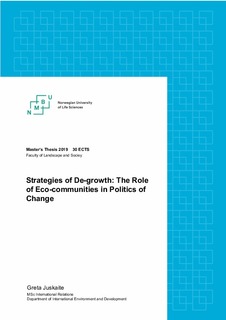| dc.description.abstract | In the age of climate change, political efforts to ensure sustainability for future generations have manifested in the rise of the ‘green growth’ objective and the green economy model. However, critics have argued that instead of reacting to a visible problem, structural change through a creation of a system that would no longer yield them, is needed. From here, the target to address the global environmental crisis ought to be the hyper-consumerist culture that solidifies the growth imperative, as opposed to the practices borne from it. One such critique is identified in the idea of de-growth, which seeks to question the use and misuse of capital by drawing public attention to the damaging effects of the global growth imperative on the environment and, in effect, broader social relations. Here, de-growth suggests a structural change based on simplicity and need rather than desire and accumulation. From here, the focus of this study is on why societies function the way they do, examining primarily the ideologies that govern them and, most importantly, exploring the possibility of change. To do that, this study argues that individual eco-communities can be considered to offer a foundation on which de-growth may be grounded and realized in practice to then be able to spread more globally. This study appropriates Gramscian conceptual framework as both the theoretical inquiry that problematizes the issue area and a tool to analyze the de-growth movement as a bottom-bottom approach led by eco-communities. Further, this thesis adopts an interpretivist research design and, thus, uses empirical findings to illustrate theoretical reasonings. From here, this study builds its theoretical argumentation based on empirical evidence collected through semi- structured interviews and participant observation in Suderbyn Ecovillage, an eco-community chosen as a study site, to determine the broader role of eco-communities in the de-growth movement, and further, the overall potential of de-growth as a Gramscian counter-hegemonic strategy to inflict structural change. | nb_NO |

